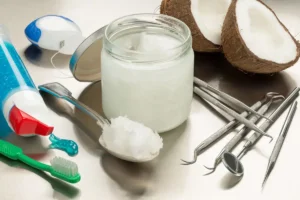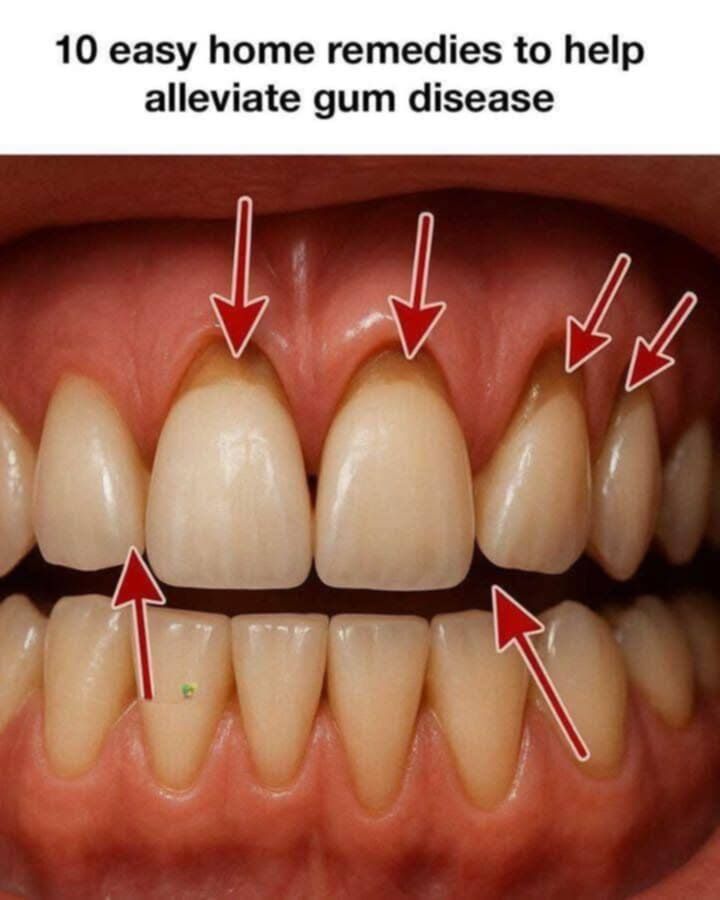Gum disease, also known as periodontal disease, affects millions of people worldwide. It typically starts with swollen, red, or bleeding gums and can progress to serious infections and even tooth loss if left untreated. While visiting a dentist is crucial for proper diagnosis and treatment, there are several natural remedies you can try at home to support your gum health and reduce symptoms.

Here are 10 easy and effective home remedies that may help alleviate gum disease:
1. Saltwater Rinse
A saltwater rinse is one of the simplest and most effective ways to reduce inflammation and fight bacteria in the mouth. Salt has natural antibacterial properties that can soothe swollen gums and speed up healing.
How to use:
- Mix 1/2 teaspoon of salt in a glass of warm water.
- Swish the solution in your mouth for 30 seconds.
- Spit it out and repeat 2–3 times a day.
2. Hydrogen Peroxide Rinse
Hydrogen peroxide can help kill harmful bacteria and reduce plaque buildup, making it a powerful ally in the fight against gum disease.
How to use:
- Mix equal parts 3% hydrogen peroxide and water.
- Swish for 30 seconds and spit it out.
- Use this rinse 2–3 times a week.
Note: Do not swallow the mixture.
3. Oil Pulling
An ancient Ayurvedic technique, oil pulling involves swishing oil in your mouth to remove toxins and improve oral hygiene. Coconut oil is a popular choice due to its antimicrobial properties.

How to use:
- Take 1 tablespoon of coconut oil.
- Swish it around your mouth for 10–20 minutes.
- Spit it into a trash can (not the sink) and rinse your mouth with warm water.
4. Aloe Vera Gel
Aloe vera is known for its anti-inflammatory and healing properties. Applying aloe vera gel directly to your gums can help soothe irritation and reduce bacteria.
How to use:
- Apply pure aloe vera gel to your gums.
- Leave it on for a few minutes, then rinse.
- Repeat 2–3 times a day.
5. Turmeric Paste
Turmeric contains curcumin, a compound with strong anti-inflammatory and antimicrobial properties that may help relieve gum swelling and pain.
How to use:
- Mix 1 teaspoon of turmeric powder with water to make a paste.
- Apply to your gums and let it sit for 10 minutes.
- Rinse with water and repeat once daily.
6. Green Tea
Green tea is rich in antioxidants that can reduce inflammation and fight the bacteria responsible for gum disease.
How to use:
- Drink 1–2 cups of unsweetened green tea daily.
- You can also cool down the tea and use it as a mouth rinse.
7. Tea Tree Oil
Tea tree oil is a natural antiseptic that may help reduce gum bleeding and inflammation.

How to use:
- Add 1–2 drops of tea tree oil to your toothpaste before brushing.
- Alternatively, mix with water to create a mouth rinse.
Caution: Do not swallow tea tree oil, and always dilute it before use.
8. Baking Soda Paste
Baking soda helps neutralize acids in the mouth and can gently scrub away plaque.
How to use:
- Mix baking soda with water to form a paste.
- Apply to your toothbrush and brush gently for 2 minutes.
- Rinse thoroughly and use a few times a week.
9. Clove Oil
Clove oil is a traditional remedy for oral pain and inflammation. It contains eugenol, which has antiseptic and anesthetic effects.
How to use:
- Dab a small amount of clove oil on a cotton ball.
- Apply it directly to the affected gums.
- Leave for a few minutes, then rinse.
10. Proper Oral Hygiene
No home remedy can substitute good oral hygiene. Brushing and flossing properly is the foundation of gum health.
Tips:
- Brush at least twice a day with a soft-bristled toothbrush.
- Floss daily to remove plaque from between teeth.
- Use an antimicrobial mouthwash to reduce bacteria.
When to See a Dentist
While these remedies can help manage mild gum issues, they are not a cure for advanced gum disease. If you experience persistent symptoms such as bleeding, pus, loose teeth, or severe pain, consult a dental professional immediately.
Final Thoughts
Taking care of your gums is just as important as taking care of your teeth. By incorporating these simple and natural remedies into your routine, you can support your gum health, reduce inflammation, and possibly slow the progression of gum disease. However, don’t skip dental check-ups—they are key to long-term oral health.


